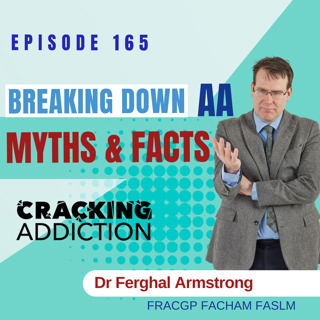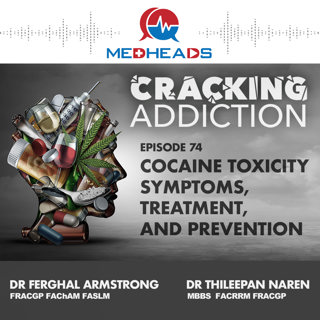
Cocaine Toxicity: Symptoms,Treatment, and Prevention
Cocaine toxicity - In this episode of Cracking Addiction, we discuss the metabolites of cocaine, the different organ systems affected by cocaine, and the harms associated with cocaine use. We discuss the harms of coingestion in particular of alcohol and cocaine and the toxic metabolite cocaethylene. We also discuss the common adulterants mixed in with cocaine and the harms that can be caused by these adulterants.Discussions and comments in our videos are for informational purposes only and should not replace the advice of your medical professional. Please consult with your doctor before making any changes to your medical treatment or lifestyle.Latest Blogshttps://www.meducate.com.au/blogAbout Meducate ®Meducate provides online education for doctors, clinicians, health professionals and the public.See the website to browse the many different talks and courses available https://www.meducate.com.au
11 Jan 202320min

Cocaine, Crack and Freebase
Cocaine, Crack and Freebase -In this episode of Cracking Addiction we explore cocaine, it's origins, the difference between powder cocaine and crack and freebase and the effects of cocaine on various organ systems and in pregnancy.Cocaine is a stimulant drug that is made from the leaves of the coca plant. It is a powerful psychoactive substance that is commonly used for recreational purposes. When ingested, cocaine produces feelings of increased energy, alertness, and euphoria. It is also a potent anesthetic and can be used medically to numb tissues and decrease bleeding during surgery.Crack is a form of cocaine that has been processed to create a rock crystal, which can be smoked. Crack cocaine is highly addictive and produces a strong, immediate high that lasts for only a few minutes. The high is followed by a crash that leaves the user feeling exhausted and depressed.Freebase is another form of cocaine that has been processed to create a more pure, potent form of the drug. It is made by mixing cocaine with ammonia or sodium bicarbonate and heating the mixture to remove the hydrochloride salt, which makes the cocaine more soluble in water. This allows the drug to be smoked, producing an intense, short-lived high. Freebase cocaine is extremely potent and can be very dangerous due to the high risk of overdose.It is important to note that all forms of cocaine are potentially harmful and can have serious short-term and long-term health effects. Regular use of cocaine can lead to addiction and can have detrimental effects on mental and physical health.Discussions and comments in our videos are for informational purposes only and should not replace the advice of your medical professional. Please consult with your doctor before making any changes to your medical treatment or lifestyle.Latest Blogshttps://www.meducate.com.au/blogAbout Meducate ®Meducate provides online education for doctors, clinicians, health professionals and the public.See the website to browse the many different talks and courses available https://www.meducate.com.au
4 Jan 202322min
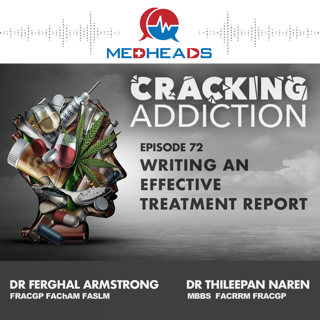
Writing an Effective Treatment Report
Dr Ferghal speaks with Dr Matthew Frei, an addiction medicine specialist who specialises in providing written reports in the field of addiction medicine. There are many agencies or entities that might request a formal opinion from an addiction medicine specialist. These include Vic Roads, insurance companies, AHPRA and the coroner’s court. When writing reports for Vic roads one must bear in mind the private and commercial driving standards. Such reports usually are requested after a patient has tested positive for a prohibited substance, or because they have tested positive for a blood alcohol concentration in excess of the legal limit (0.05%). Reports may be requested by insurance companies regarding the suitability of ongoing high dose opioid prescribing, usually in the context of chronic pain. Court reports usually are requested in the context of alleged medical error or negligence. Dr Frei’s advice to anyone considering writing a report is firstly to maintain impartiality, and secondly to be aware that the report will be scrutinised by all parties with a material interest in the matter at hand. For those starting out it is useful to bear in mind that language does not have to be literary, and that it is more important to be factually correct and fair in providing an opinion.Discussions and comments in our videos are for informational purposes only and should not replace the advice of your medical professional. Please consult with your doctor before making any changes to your medical treatment or lifestyle.Latest Blogshttps://www.meducate.com.au/blogAbout Meducate ®Meducate provides online education for doctors, clinicians, health professionals and the public.See the website to browse the many different talks and courses available https://www.meducate.com.au
28 Dec 202224min
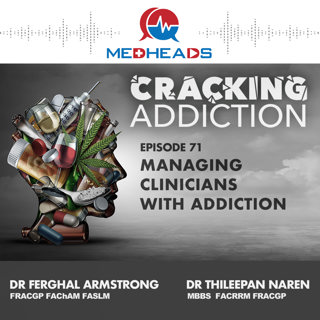
Tips for Managing Clinicians Who Struggle with Addiction
Dr Ferghal speaks with Dr Matthew Frei, an addiction medicine specialist who specialises in the care and management of clinicians who find themselves struggling with addictions.Clinicians face significant stigma when dealing with their own illnesses, and even more so in the situation of mental illness and substance use disorder. An additional barrier to accessing treatment is the regulatory environment within which clinicians must access care. This includes the potential for mandatory reporting to AHPRA. For these reasons clinicians tend to present late for help. The good news is however that clinicians are more likely to make a recovery from addiction, in that they are, as Dr Frei states, “overrepresented in success stories”.Discussions and comments in our videos are for informational purposes only and should not replace the advice of your medical professional. Please consult with your doctor before making any changes to your medical treatment or lifestyle.Latest Blogshttps://www.meducate.com.au/blogAbout Meducate ®Meducate provides online education for doctors, clinicians, health professionals and the public.See the website to browse the many different talks and courses available https://www.meducate.com.au
21 Dec 202223min
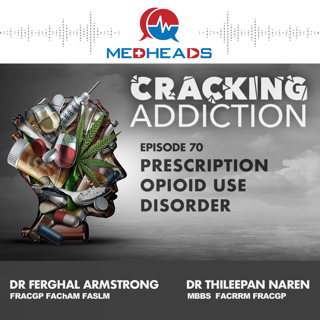
Prescription opioid use disorder
In this episode of Cracking Addiction I speak with Associate Professor Suzanne Nielsen about the opioid epidemic and what we can do about it.In the USA there seems to be more a problem with heroin whereas in Australia we are struggling with prescription opioid dependence. Even though a doctor may be prescribing your pain killers, it is still possible to become addicted to pain killers. The traditional treatments we have for opioid dependence in general include methadone and buprenorphine based opioid replacement therapy. A recent addition to the family includes the Long -Acting Injectable Buprenorphine therapies, commonly referred to as “the Injection”. Patients who struggle with prescription opioid use disorder (which has been referred to as “pain killer addiction”) also benefit from opioid replacement therapy. Suzanne’s research over the last ten years has proven that the same therapies that work for heroin dependency, also work for prescription opioid dependency.Discussions and comments in our videos are for informational purposes only and should not replace the advice of your medical professional. Please consult with your doctor before making any changes to your medical treatment or lifestyle.Latest Blogshttps://www.meducate.com.au/blogAbout Meducate ®Meducate provides online education for doctors, clinicians, health professionals and the public.See the website to browse the many different talks and courses available https://www.meducate.com.au
14 Dec 202219min
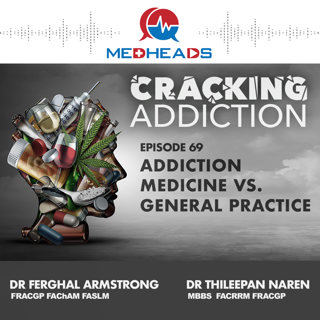
Addiction Medicine vs. General Practice
In episode 69 of Cracking Addiction we discuss the difference and similarities between general practice and Addiction Medicine. We discuss Addiction Medicine consultation liaison services in hospital, inpatient and community management options with regards to Addiction Medicine. Lastly we discuss the role general practitioners play in managing patients with substance use disorders within the community and the breadth of community presentations and continuity of care that they provide their patients.Discussions and comments in our videos are for informational purposes only and should not replace the advice of your medical professional. Please consult with your doctor before making any changes to your medical treatment or lifestyle.Latest Blogshttps://www.meducate.com.au/blogAbout Meducate ®Meducate provides online education for doctors, clinicians, health professionals and the public.See the website to browse the many different talks and courses available https://www.meducate.com.au
7 Dec 202225min
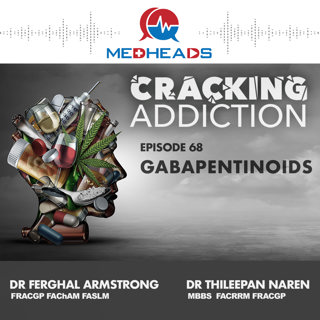
Gabapentinoids
In this episode of Cracking Addiction we discuss the class of drugs known as gabapentinoids, a group of GABA analogues. In this episode we discuss the clinical uses of gabapentinoids and also the increasing rates of prescription of gabapentinoids in recent years and the resultant harms associated with gabapentinoids including the risks of dependence/addiction as well as increased rates of overdose and polypharmacy harms.Discussions and comments in our videos are for informational purposes only and should not replace the advice of your medical professional. Please consult with your doctor before making any changes to your medical treatment or lifestyle.Latest Blogshttps://www.meducate.com.au/blogAbout Meducate ®Meducate provides online education for doctors, clinicians, health professionals and the public.See the website to browse the many different talks and courses available https://www.meducate.com.au
30 Nov 202220min
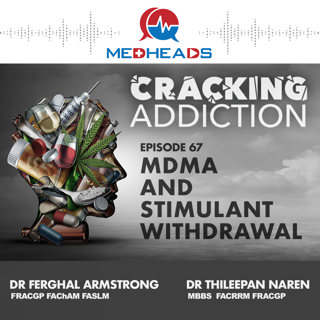
MDMA and stimulant withdrawal
In episode 67 of Cracking Addiction we discuss the management of acute intoxication of MDMA and discuss the principles of both MDMA and stimulant withdrawal including supportive management options as well as the importance of psychosocial interventions in particular contingency management and CBT based interventions.Discussions and comments in our videos are for informational purposes only and should not replace the advice of your medical professional. Please consult with your doctor before making any changes to your medical treatment or lifestyle.Latest Blogshttps://www.meducate.com.au/blogAbout Meducate ®Meducate provides online education for doctors, clinicians, health professionals and the public.See the website to browse the many different talks and courses available https://www.meducate.com.au
23 Nov 202217min
